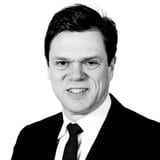contents
There are words that are no longer usable: They are discriminatory or incorrect in terms of content – but they are definitely sensitive. The “Die Welt” journalist Matthias Heine gets to the bottom of such “broken words” in his new book.
Matthias Heine does not present himself as a “language police”. However, the term is among the 78 words he discusses in his book. “The allegation of the language police is a somewhat more indirect way of saying: ‘You’ll probably still be allowed to say that.’ Most of the time, those who formulate it throw themselves into the pose of the persecuted opponent of the regime,” he wrote four years ago.
In 2021, the “language police” came second in the “nonsense word of the year”. The reason: As language police, people would be defamed who advocate an appropriate, fairer and non-discriminatory use of language.
Heine therefore writes with a view to the non-word jury: “If the language police say that they should not be called language police, then distrust and cheerful disregard are the order of the day.”
Historically Rooted Words
The term “language police” appeared a century ago. In 1911 the «Allgemeine Deutsche Sprachverein» headlined an article «Something about the language police». At that time, the focus for the so-called language caregivers was the fight against foreign words and the commitment to Germanization.
After 1930, the term “language police” was not used for decades, writes Heine. Although the Nazis strictly regulated the language with their “press instructions”, “no one would have dared to call them language police”. The word has been patrolling the media again since the 1980s.
Discrimination often goes unnoticed
Matthias Heine, who last year published a book about “500 Years of German Youth Language”, gets to the bottom of the origin and use of these “broken words”. He treats each keyword in four, mostly short, paragraphs: origin, use, criticism, assessment.
This is informative and always liberal in judgment. The author makes it clear that it is not about “bans” on words, but about a discussion about whether a word discriminates or taunts someone.
“Dwarf”, for example, is unproblematic for fantasy creatures, but not for “people of short stature”, who have increasingly been described as such since the 1960s.
“Mohammedaner” instead of “Muslim” is a factually inaccurate word that only right-wing extremists use today.
“Belarus” is better known as “Belarus” because the name derives from the old dominion of the “Kievan Rus” and not from Russia.
“Black Africa” is also imprecise and should therefore rather be described as “Central Africa” or “Sub-Saharan Africa”.
Language must be renegotiated
The journalist also exposes false reports such as: “A Berlin district office only allows Christmas markets if they are called ‘Winter Market’.” These are unfounded allegations that only serve to create atmosphere.
The language belongs to all of us. We think in her and exchange ideas with her help. It is all the more important that we think about how we can do this in a precise and non-discriminatory manner. With his book “Broken Words?” Matthias Heine provides a lot of useful information in an undramatic, factual tone that is good for the discussion.
SRF 2 culture, culture news, September 15, 2022, 8:06 a.m.
